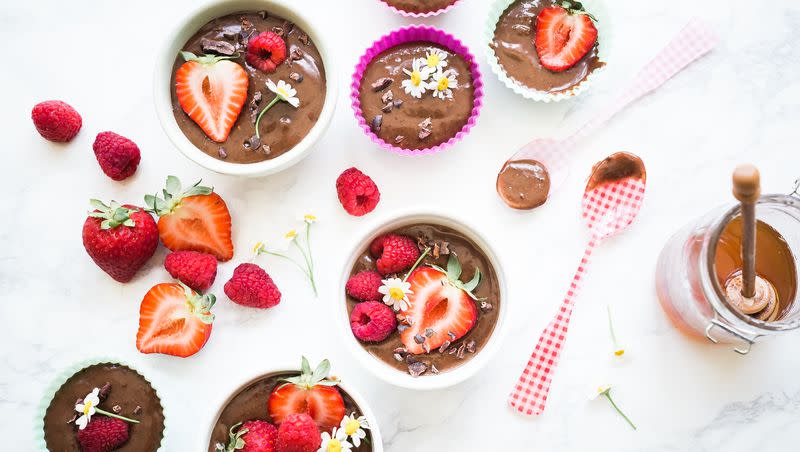Right now, desserts are all about subverting expectations

A few weeks ago, Natasha Pickowicz, the popular pastry chef, baker and activist, published her debut dessert cookbook, “More than Cake.”
The three-time James Beard Award nominee wrote 100 recipes “built for pleasure and community,” and while it’s indeed a dessert cookbook, instructional by nature, the recipes and accompanying headnotes seem to evoke something a little deeper than measure this, stir that, pour it in the pan, set the timer.
Pickowicz makes a strong case for cake as a form of resistance. Not in the rah rah sense, but in the way that in the face of oppression, joy is a radical act. Cake, being an agent of joy, is therefore radical.
The author is known for making cakes that revel in their imperfections, squiggle-piped confections that are decorated with flowers and nutmeg pods, basil bunches and cinnamon sticks, whatever’s seasonal and on hand — the “flaws” are exactly why people are drawn to them. As Pickowicz said in an interview with Saveur, “I like thinking beyond what we think ‘should’ be on a layer cake and instead just saying, ‘Well, what’s around me? How can I make this personal?’”
Abi Balingit subverts Filipino desserts in ‘Mayumu’
Likewise, what seems to draw readers and bakers into Abi Balingit’s orbit is her dedication to the Tagalog saying she grew up hearing from her Filipino mother, “Bahala ka sa buhay mo!” — or, “Do whatever with your life!” Balingit’s compendium of Filipino American desserts, ”Mayumu,” published in February, is every bit a personal expression of the home baker’s adapted culture.
Mayumu is the Kapampangan word for “sweet,” and Balingit writes that her mother never cared for sugar-laden American desserts, which she found too mayumu. That didn’t mean she had a childhood deprived of sweets though — Balingit sampled combinations of sweet, salty, savory, sour and umami in dessert form, and her book encompasses the multicultural influences she grew up with in the Bay Area and Central Valley. In her book’s introduction, she writes an invitation to readers to “embrace your own ingenuity and let go of some preconceptions of what is possible in both Filipino and American desserts.”
Delicacies made from rice and coconut milk are the cornerstone of Filipino desserts, and in “Mayumu” that’s represented in recipes for treats like vanilla bean cassava cake and sapin-sapin, a tri-layered rice cake that traditionally incorporates tropical flavors, but in Balingit’s version, is turned into a strawberry shortcake, inspired by the Good Humor ice cream bars she loved as a child.
Alison Roman pushes baking stigmas in ‘Sweet Enough’
This season has been full of subverted expectations surrounding the meal’s sweet course. In March, Alison Roman released her dessert cookbook, “Sweet Enough,” a cool girl’s admission that saccharine sundaes are not in vogue, but she has a simple plan to help you get past baking’s stigmas.
In an interview with Vogue, she talked about how she’s internalized some of those barbs, which are “bizarrely gendered” — no coincidence that all of these authors are women. Roman said, “It feels almost anti-feminist to be like, maybe get in the kitchen and make a tart?” She talks about how baking has an association with 1950s American culture, “a thing that you do that’s nice.” She argues, “But I also think desserts are nice, right? They’re lovely, the people who make them are lovely.”
Even within her dessert cookbook, though, she still distances herself from what she considers the baking crowd. “I’m not measured or precise,” she told Vogue. “My culinary style is more like jazz, whereas baking is classical. But I felt excited about writing a book for other people who don’t relate to any of the cultural baggage that baking has but still enjoy desserts.”
Baking is an act of love in Claire Ptak’s ‘Love is a Pink Cake’
There’s also “Love is a Pink Cake” from Chez Panisse alum Claire Ptak — who runs the popular London bakery, Violet Cakes (and famously created Prince Harry and Meghan Markle’s wedding cake) — premised on the concept that baking is an act of love. Publishing in early May, Ptak’s book is divided into halves — one side delves into desserts inspired by her California upbringing, and the other by her adopted home in Great Britain.
She writes in the introduction, “We bake for love. Whether it’s for ourselves, to show love for a child, friend, or partner, or to celebrate a rite of passage, there is no denying the incredible effect cakes have.”
These dessert cookbooks push expectations
All four dessert cookbooks, while each wildly different, have a self-justifying bent to them, an acknowledgment that dessert has a certain reputation, and these treatises are more than, beyond, between the lines of.
Filipino desserts do not get much attention in mainstream American food culture, and cake is something more than what you’ve known it to be. It can be covered in flowers, make use of ingredients like sunchoke and worm salt, and it can, in the words of Pickowicz, spread “delight in a way that no other kind of dish can.”
Even Roman’s lackadaisical approach — “eh, sweet enough” — is its own rejoinder to a world that made the trained pastry chef reluctant to write a dessert-specific cookbook in the first place. This coterie of spring dessert titles somehow speak in unison that while the idea of dessert as an act of love and care, comfort and togetherness is rather timeless, radical joy is particularly crucial to the cataclysmic times we’re living in, so these cakes have never been more important.

